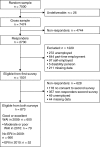Effort-reward imbalance and work ability: cross-sectional and longitudinal findings from the Second German Sociomedical Panel of Employees
- PMID: 23067110
- PMCID: PMC3505747
- DOI: 10.1186/1471-2458-12-875
Effort-reward imbalance and work ability: cross-sectional and longitudinal findings from the Second German Sociomedical Panel of Employees
Abstract
Background: Although data from longitudinal studies are sparse, effort-reward imbalance (ERI) seems to affect work ability. However, the potential pathway from restricted work ability to ERI must also be considered. Therefore, the aim of our study was to analyse cross-sectional and longitudinal associations between ERI and work ability and vice versa.
Methods: Data come from the Second German Sociomedical Panel of Employees. Logistic regression models were estimated to determine cross-sectional and longitudinal associations. The sample used to predict new cases of poor or moderate work ability was restricted to cases with good or excellent work ability at baseline. The sample used to predict new cases of ERI was restricted to persons without ERI at baseline.
Results: The cross-sectional analysis included 1501 full-time employed persons. The longitudinal analyses considered 600 participants with good or excellent baseline work ability and 666 participants without baseline ERI, respectively. After adjustment for socio-demographic variables, health-related behaviour and factors of the work environment, ERI was cross-sectionally associated with poor or moderate work ability (OR = 1.980; 95% CI: 1.428 to 2.747). Longitudinally, persons with ERI had 2.1 times higher odds of poor or moderate work ability after one year (OR = 2.093; 95% CI: 1.047 to 4.183). Conversely, persons with poor or moderate work ability had 2.6 times higher odds of an ERI after one year (OR = 2.573; 95% CI: 1.314 to 5.041).
Conclusions: Interventions that enable workers to cope with ERI or address indicators of ERI directly could promote the maintenance of work ability. Integration management programmes for persons with poor work ability should also consider their psychosocial demands.
Figures
Similar articles
-
Associations between overcommitment, effort-reward imbalance and mental health: findings from a longitudinal study.Int Arch Occup Environ Health. 2019 May;92(4):559-567. doi: 10.1007/s00420-018-1391-7. Epub 2018 Dec 7. Int Arch Occup Environ Health. 2019. PMID: 30535878
-
Adverse effects of effort-reward imbalance on work ability: longitudinal findings from the German Sociomedical Panel of Employees.Int J Public Health. 2012 Oct;57(5):797-805. doi: 10.1007/s00038-011-0304-2. Epub 2011 Sep 20. Int J Public Health. 2012. PMID: 21931975
-
Effort-reward imbalance at work and risk of sleep disturbances. Cross-sectional and prospective results from the Danish Work Environment Cohort Study.J Psychosom Res. 2009 Jan;66(1):75-83. doi: 10.1016/j.jpsychores.2008.05.005. Epub 2008 Nov 22. J Psychosom Res. 2009. PMID: 19073297
-
Job strain, effort-reward imbalance and employee well-being: a large-scale cross-sectional study.Soc Sci Med. 2000 May;50(9):1317-27. doi: 10.1016/s0277-9536(99)00388-3. Soc Sci Med. 2000. PMID: 10728851 Review.
-
A systematic review of effort-reward imbalance among health workers.Int J Health Plann Manage. 2018 May 3. doi: 10.1002/hpm.2541. Online ahead of print. Int J Health Plann Manage. 2018. PMID: 29722057 Review.
Cited by
-
Factors associated with work ability and intention to leave nursing profession: a nested case-control study.Ind Health. 2022 Feb 8;60(1):29-39. doi: 10.2486/indhealth.2021-0085. Epub 2021 Oct 8. Ind Health. 2022. PMID: 34629370 Free PMC article. Clinical Trial.
-
Changes in Working Conditions and Mental Health Among Intensive Care Physicians Across a Decade.Front Psychiatry. 2020 Mar 31;11:145. doi: 10.3389/fpsyt.2020.00145. eCollection 2020. Front Psychiatry. 2020. PMID: 32296349 Free PMC article.
-
Work ability and psychosocial work stress - predictors of retirement intention among older teachers.Int J Occup Med Environ Health. 2024 Dec 9;37(5):508-523. doi: 10.13075/ijomeh.1896.02454. Epub 2024 Dec 5. Int J Occup Med Environ Health. 2024. PMID: 39641264 Free PMC article.
-
Evaluation of the correlation between effort-reward imbalance and sleep quality among community health workers.BMC Health Serv Res. 2021 May 22;21(1):490. doi: 10.1186/s12913-021-06526-w. BMC Health Serv Res. 2021. PMID: 34022915 Free PMC article.
-
Association between work ability and work stressors: cross-sectional survey of elderly services and health and social care service employees.Arch Public Health. 2022 Mar 15;80(1):83. doi: 10.1186/s13690-022-00841-2. Arch Public Health. 2022. PMID: 35292109 Free PMC article.
References
-
- Spiegel JM, Labonte R, Ostry AS. Understanding "globalization" as a determinant of health determinants: a critical perspective. Int J Occup Environ Health. 2004;10(4):360–367. - PubMed
-
- Rama M. Globalization and the labor market. World Bank Res Obs. 2003;18(2):159–186. doi: 10.1093/wbro/lkg010. - DOI
-
- Siegrist J. Adverse health effects of high-effort/low-reward conditions. J Occup Health Psychol. 1996;1(1):27–41. - PubMed
Publication types
MeSH terms
LinkOut - more resources
Full Text Sources


